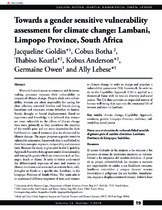| dc.contributor.author | Goldin, Jacqueline | |
| dc.contributor.author | Botha, Cobus | |
| dc.contributor.author | Koatla, Tabiso | |
| dc.date.accessioned | 2021-07-02T12:01:17Z | |
| dc.date.available | 2021-07-02T12:01:17Z | |
| dc.date.issued | 2019 | |
| dc.identifier.citation | Goldin, J. et al. (2019). Towards a gender sensitive vulnerability assessment for climate change: Lambani, Limpopo Province, South Africa. Human Geography(United Kingdom), 12(1), 19–32. https://doi.org/10.1177/194277861901200102 | en_US |
| dc.identifier.issn | 2633-674X | |
| dc.identifier.uri | https://doi.org/10.1177/194277861901200102 | |
| dc.identifier.uri | http://hdl.handle.net/10566/6355 | |
| dc.description.abstract | Women’s limited access to resources and decisionmaking processes increases their vulnerability to
impacts of climate change. Despite their own vulnerability, women are often responsible for caring for
close relatives, extended families and friends during
hazardous and traumatic events (whether its famine,
foods, drought or forced displacements). Based on
experience and knowledge it is believed that women
are more vulnerable to the efects of climate change
than men, primarily as they constitute the majority
of the world’s poor and are more dependent for their
livelihood on natural resources that are threatened by
climate change. Te paper proposes a gender sensitive
vulnerable assessment framework that is scafolded by
three key concepts: exposure, temporality and resource
base. Because the study is grounded in the Capability
Approach Framework it captures multi-dimensionality
and intangible goods which are emotions such as fear,
anger, shock or shame. | en_US |
| dc.language.iso | en | en_US |
| dc.publisher | SAGE | en_US |
| dc.subject | Climate change | en_US |
| dc.subject | Emotions | en_US |
| dc.subject | Gender | en_US |
| dc.subject | Limpopo Province | en_US |
| dc.subject | Resilience | en_US |
| dc.title | Towards a gender sensitive vulnerability assessment for climate change: Lambani, Limpopo Province, South Africa | en_US |
| dc.type | Article | en_US |

